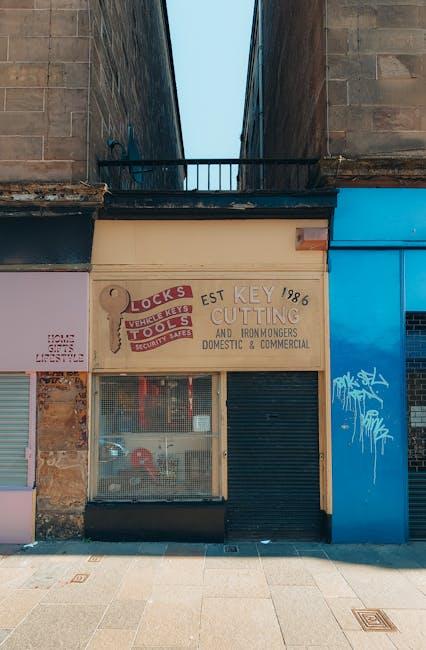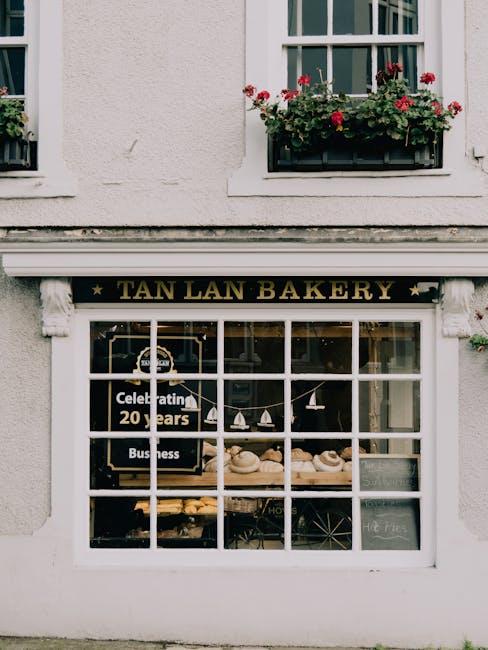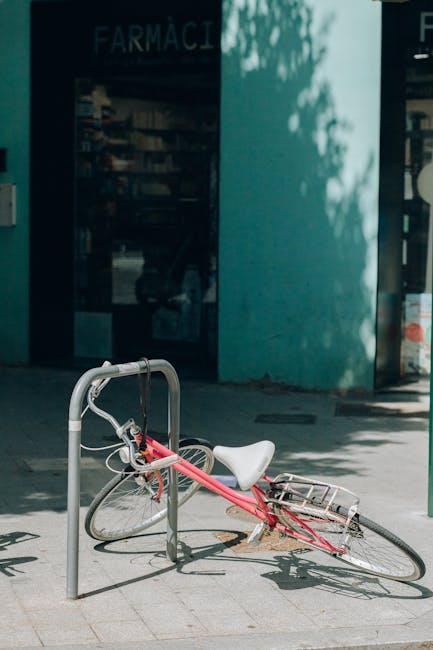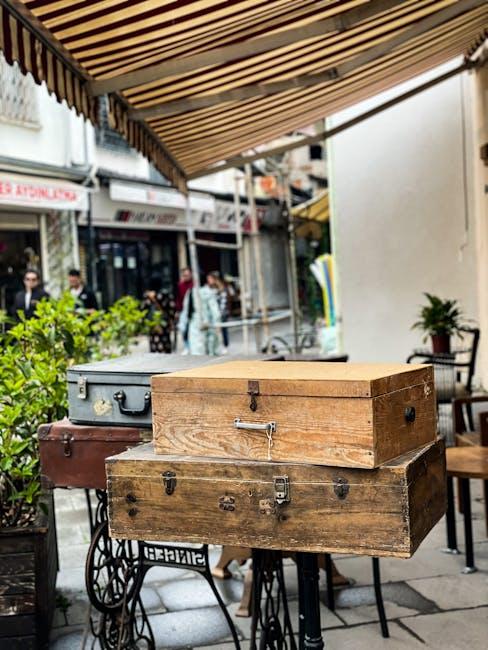In the bustling retail landscape of the Twin Cities, where vibrant storefronts line the streets and welcome a steady stream of customers, security remains a paramount concern. As the heart of business district activity, these storefronts are not only hubs of commerce but also vulnerable points that require thoughtful protection. Navigating the array of lock options available can be overwhelming, but choosing the right security measures is essential to safeguard your merchandise, your brand reputation, and your peace of mind. This article explores practical, effective lock solutions tailored to the unique needs of Twin Cities retailers, helping you secure your storefront with confidence.
Table of Contents
- Choosing the Right Lock Systems for Retail Security
- Enhancing Protection with Electronic and Smart Locks
- Best Practices for Master Key and Access Control Management
- Understanding Local Regulations and Compliance Requirements
- Partnering with Trusted Locksmiths for Ongoing Security Support
- Q&A
- In Conclusion

Choosing the Right Lock Systems for Retail Security
When selecting locks for your retail store, consider more than just the basic options. High-traffic urban environments like the Twin Cities demand robust security solutions that blend durability with convenience. Opting for keyless entry systems or smart locks can elevate your store’s protection, offering easy access control and real-time monitoring. These systems minimize risks of lost keys while allowing you to manage multiple entry points remotely, ideal for multi-shift stores or businesses with several employees.
Different retail environments require tailored security setups, from storefront display areas to backrooms and loading docks. Here’s a quick overview of lock types to guide your choice:
- Deadbolts: Traditional and reliable, best for external doors.
- Electromagnetic locks: Ideal for high-traffic exits, paired with alarm systems.
- Padlocks: Versatile for storage or outdoor gates, especially weather-resistant models.
- Biometric locks: Advanced security for sensitive areas, using fingerprint or retina identification.

Enhancing Protection with Electronic and Smart Locks
In an era where technology seamlessly merges with everyday security, electronic and smart locks offer Twin Cities retailers a sophisticated layer of protection tailored to modern needs. Unlike traditional locks, these innovative solutions provide retailers with remote access control, real-time monitoring, and customizable permissions for employees. Imagine being able to grant temporary access to delivery personnel or restrict entry during off-hours-all managed through an intuitive app on your smartphone or computer.
Beyond convenience, these advanced locks boast features that enhance security resilience. Many models include tamper alerts, auto-locking mechanisms, and integration with existing alarm systems or surveillance cameras. For a quick comparison, consider the following:
| Feature | Electronic Locks | Smart Locks |
|---|---|---|
| Remote Access | Limited | Full control via app |
| Access Logs | Basic | Detailed, timestamped |
| Integration | Security systems | Security, IoT devices |
| Power Source | Batteries | Rechargeable batteries/solar |
- Custom Access Codes: Generate unique entry codes for employees and vendors.
- Biometric Options: Some smart locks offer fingerprint and facial recognition.
- Audit Trails: Keep track of who enters and when, enhancing accountability.
With these capabilities, electronic and smart locks do more than secure doors; they empower store owners with control and insights necessary for safeguarding their business in a dynamic retail environment.

Best Practices for Master Key and Access Control Management
Implementing a robust master key system involves more than just convenience-it’s about strategic security layering. Start by limiting the number of master key holders to essential personnel only, reducing the risk of unauthorized access. Regularly audit who holds master keys and update access permissions promptly in case of staff changes. Pair physical keys with an access control system that logs entries, offering an extra layer of accountability. Combining traditional and modern security tools ensures your storefront remains both accessible to authorized users and out of reach for potential intruders.
To streamline access and monitor entry points effectively, consider using tiered access control levels tailored to different areas of your store. For example:
- General employees receive access to sales floors and stockrooms.
- Managers have privileges for back offices and cash registers.
- Top-level executives or security staff retain master key access to all sections.
| Access Level | Key Holder | Area Access |
|---|---|---|
| Employee | All Staff | Sales Floor, Stockroom |
| Manager | Shift Leads | Back Office, Cash Registers |
| Master | Owner, Security | Entire Premises |

Understanding Local Regulations and Compliance Requirements
Retail security in the Twin Cities isn’t just about choosing the sturdiest lock; it’s also about aligning your choices with local laws and industry standards. Minnesota’s municipal codes can vary significantly across neighborhoods, especially regarding storefront security measures. For instance, some areas require fire-rated exit devices or stipulate specific types of locks on secondary entrances to ensure customer safety during emergencies. Staying informed on these regulations helps retailers avoid costly fines and ensures a smooth operation without unexpected legal obstacles.
To navigate compliance seamlessly, it’s wise to consider the following key factors when selecting locks:
- Fire Safety Standards: Locks must meet fire code requirements, facilitating quick egress.
- Accessibility Laws: Compliance with ADA standards to guarantee accessibility.
- Theft Deterrence Regulations: Certain areas may require enhanced features like anti-tampering bolts.
| Requirement | Typical Local Rule | Impact on Lock Choice |
|---|---|---|
| Fire Exit Compliance | Locks must allow immediate exit without a key | Push bar or panic hardware recommended |
| ADA Accessibility | Handles between 34″-48″ above finished floor | Lever-style handles preferred |
| Theft Prevention | Hardened steel or anti-pry features encouraged | High-security cylinder locks advisable |

Partnering with Trusted Locksmiths for Ongoing Security Support
Maintaining robust security for your storefront is an ongoing challenge that requires more than just installing high-quality locks. By collaborating with experienced locksmiths who understand the unique needs of Twin Cities retailers, you gain access to expert advice, timely maintenance, and rapid emergency responses. These trusted partners bring peace of mind, ensuring that your locking systems remain reliable amid evolving threats and wear over time.
Key advantages of working with professional locksmiths include:
- Customized security assessments tailored to your retail layout and local risks
- Regular inspections and adjustments to prevent lock failures before they happen
- Access to advanced lock technologies and updates for integration
- Swift, local emergency services minimizing downtime and loss
| Service | Benefit |
|---|---|
| Security Consultations | Optimized store-specific lock solutions |
| Scheduled Maintenance | Prolonged lock lifespan and reliability |
| Emergency Lockout Support | Minimal business disruption |
| Lock Upgrades | Enhanced protection against break-ins |
Q&A
Q&A: Secure Your Storefront – Lock Options for Twin Cities Retailers
Q1: Why is securing my storefront important for my Twin Cities retail business?
A1: Securing your storefront is crucial to protect your merchandise, prevent break-ins, and maintain customer trust. In the bustling Twin Cities market, where retail competition is high, a reliable lock system safeguards your investment and keeps operations running smoothly.
Q2: What types of locks are best suited for retail storefronts in the Twin Cities?
A2: Retailers often opt for a combination of high-security cylinder locks, deadbolts, and electronic access controls. Weather-resistant options are vital to handle Minnesota’s varying climate. Smart locks with remote monitoring capabilities are also gaining popularity for enhanced security and convenience.
Q3: Are electronic locks a good choice for storefronts?
A3: Yes, electronic locks offer several advantages such as keyless entry, audit trails, and the ability to schedule access. They integrate well with alarm systems and can be managed remotely-ideal for retailers who want to control access without distributing multiple physical keys.
Q4: How can I reinforce the physical security of my retail doors besides lock selection?
A4: Reinforcing door frames, installing security bars or grills, and using shatterproof glass contribute significantly to storefront security. Coupling strong locks with durable materials creates a formidable barrier against forced entry.
Q5: What role do professional locksmiths play in securing storefronts?
A5: Professional locksmiths assess vulnerabilities, recommend appropriate lock systems, and ensure proper installation. They also provide maintenance and emergency services, ensuring your storefront remains secure over time.
Q6: Are there specific lock brands or certifications Twin Cities retailers should consider?
A6: Look for locks certified by ANSI/BHMA with Grade 1 or 2 ratings for commercial use. Trusted brands like Medeco, Schlage, and Kwikset offer durable options tailored for heavy traffic retail environments.
Q7: How can I balance security with customer accessibility?
A7: Employ locks that secure after hours but allow easy access during business hours, such as timed electronic locks or reinforced push bars. Clear signage and well-lit entrances also help maintain a welcoming yet secure façade.
Q8: What inexpensive security upgrades can small retailers implement immediately?
A8: Simple steps like upgrading to heavy-duty deadbolts, installing door alarms, and reinforcing strike plates can significantly enhance security without a large investment. Combining these with vigilant staff training creates a strong defense.
Q9: How often should I review or upgrade my storefront locks?
A9: Conduct a security review annually or after any incident. Retailers should consider upgrades when technology improves, keys are lost, or after tenant turnover in shared commercial spaces.
Q10: Where can Twin Cities retailers find reliable security consultants or locksmith services?
A10: Local business associations, the Better Business Bureau, and online reviews can guide retailers to reputable locksmiths and security specialists in Minneapolis and St. Paul. A trusted professional partnership is key to ongoing storefront protection.
In Conclusion
As the Twin Cities continue to thrive as a bustling retail hub, safeguarding your storefront is more than just a precaution-it’s a commitment to your business’s future. By carefully selecting lock options that blend resilience with convenience, retailers can create a secure foundation that deters threats and welcomes customers with confidence. Remember, the right lock is more than hardware; it’s peace of mind woven into the very fabric of your storefront. Secure your space wisely, and watch your business flourish behind every locked door.





